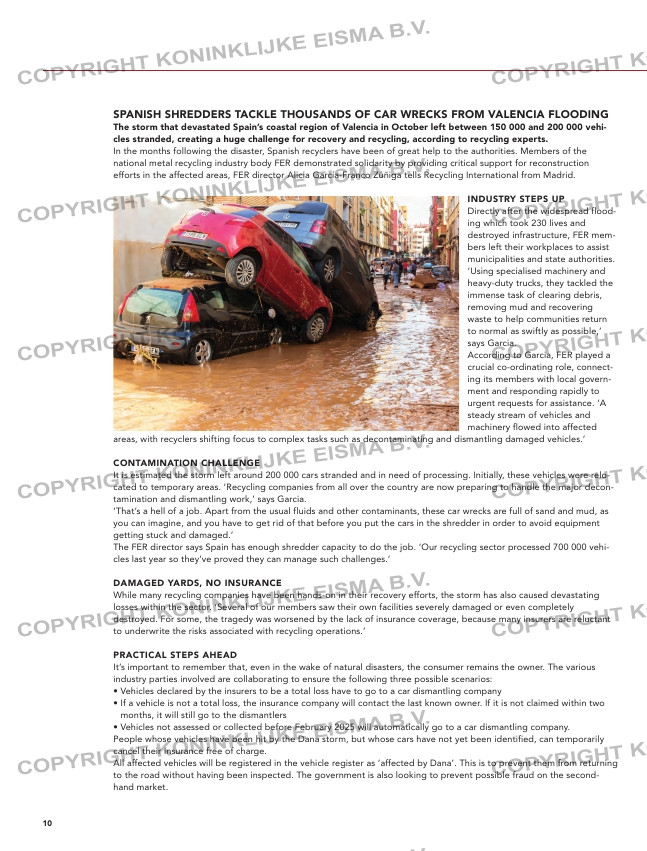Page 10 from: Recycling International Jan/Feb 2025

10
SPANISH SHREDDERS TACKLE THOUSANDS OF CAR WRECKS FROM VALENCIA FLOODING
The storm that devastated Spain’s coastal region of Valencia in October left between 150 000 and 200 000 vehi-
cles stranded, creating a huge challenge for recovery and recycling, according to recycling experts.
In the months following the disaster, Spanish recyclers have been of great help to the authorities. Members of the
national metal recycling industry body FER demonstrated solidarity by providing critical support for reconstruction
efforts in the affected areas, FER director Alicia García-Franco Zúñiga tells Recycling International from Madrid.
INDUSTRY STEPS UP
Directly after the widespread flood-
ing which took 230 lives and
destroyed infrastructure, FER mem-
bers left their workplaces to assist
municipalities and state authorities.
‘Using specialised machinery and
heavy-duty trucks, they tackled the
immense task of clearing debris,
removing mud and recovering
waste to help communities return
to normal as swiftly as possible,’
says Garcia.
According to Garcia, FER played a
crucial co-ordinating role, connect-
ing its members with local govern-
ment and responding rapidly to
urgent requests for assistance. ‘A
steady stream of vehicles and
machinery flowed into affected
areas, with recyclers shifting focus to complex tasks such as decontaminating and dismantling damaged vehicles.’
CONTAMINATION CHALLENGE
It is estimated the storm left around 200 000 cars stranded and in need of processing. Initially, these vehicles were relo-
cated to temporary areas. ‘Recycling companies from all over the country are now preparing to handle the major decon-
tamination and dismantling work,’ says Garcia.
‘That’s a hell of a job. Apart from the usual fluids and other contaminants, these car wrecks are full of sand and mud, as
you can imagine, and you have to get rid of that before you put the cars in the shredder in order to avoid equipment
getting stuck and damaged.’
The FER director says Spain has enough shredder capacity to do the job. ‘Our recycling sector processed 700 000 vehi-
cles last year so they’ve proved they can manage such challenges.’
DAMAGED YARDS, NO INSURANCE
While many recycling companies have been hands-on in their recovery efforts, the storm has also caused devastating
losses within the sector. ‘Several of our members saw their own facilities severely damaged or even completely
destroyed. For some, the tragedy was worsened by the lack of insurance coverage, because many insurers are reluctant
to underwrite the risks associated with recycling operations.’
PRACTICAL STEPS AHEAD
It’s important to remember that, even in the wake of natural disasters, the consumer remains the owner. The various
industry parties involved are collaborating to ensure the following three possible scenarios:
• Vehicles declared by the insurers to be a total loss have to go to a car dismantling company
• If a vehicle is not a total loss, the insurance company will contact the last known owner. If it is not claimed within two
months, it will still go to the dismantlers
• Vehicles not assessed or collected before February 2025 will automatically go to a car dismantling company.
People whose vehicles have been hit by the Dana storm, but whose cars have not yet been identified, can temporarily
cancel their insurance free of charge.
All affected vehicles will be registered in the vehicle register as ‘affected by Dana’. This is to prevent them from returning
to the road without having been inspected. The government is also looking to prevent possible fraud on the second-
hand market.
COMMISSION CLEARS TAKEOEVER OF DS
SMITH
The European Commission
has approved the acquisition
of DS Smith by International
Paper (IP) after IP agreed to
sell five plants in Europe to
address competition con-
cerns.
When the acquisition was
announced in November 2024,
the Commission launched an
investigation amid concerns
the deal would reduce compe-
tition in the markets for the
manufacture and supply of
corrugated sheets Portugal,
heavy duty corrugated sheets
in Spain and corrugated cases
in France.
The Commission found that
the transaction would have resulted in high combined shares, as
well as high concentration levels, in several local markets. It also
found that, after the merger, there would be insufficient alterna-
tive competitors. This would have led to higher prices for consum-
ers in the affected markets.
To address the concerns, IP offered to divest five plants in Europe:
three in Normandy, France; one in Ovar, Portugal; and one in
Bilbao, Spain. The Commission has yet to approve those buying
the divested businesses.
‘These commitments fully address the competition concerns iden-
tified by the Commission, by fully removing the overlaps between
the parties’ activities in the corrugated cases markets in north-
west France,’ the Commission said in a statement.
‘The commitments also eliminate the overlap as regards the sup-
ply of corrugated sheets in the problematic local markets in
Portugal and Spain and, as such, any vertical foreclosure concerns
regarding corrugated cases.’
sustainable wear parts for
sustainable recycling
www.stahlwerke-bochum.com
10-11-12-13-14-15_trendsupdatesi.indd 10 29-01-2025 16:26



